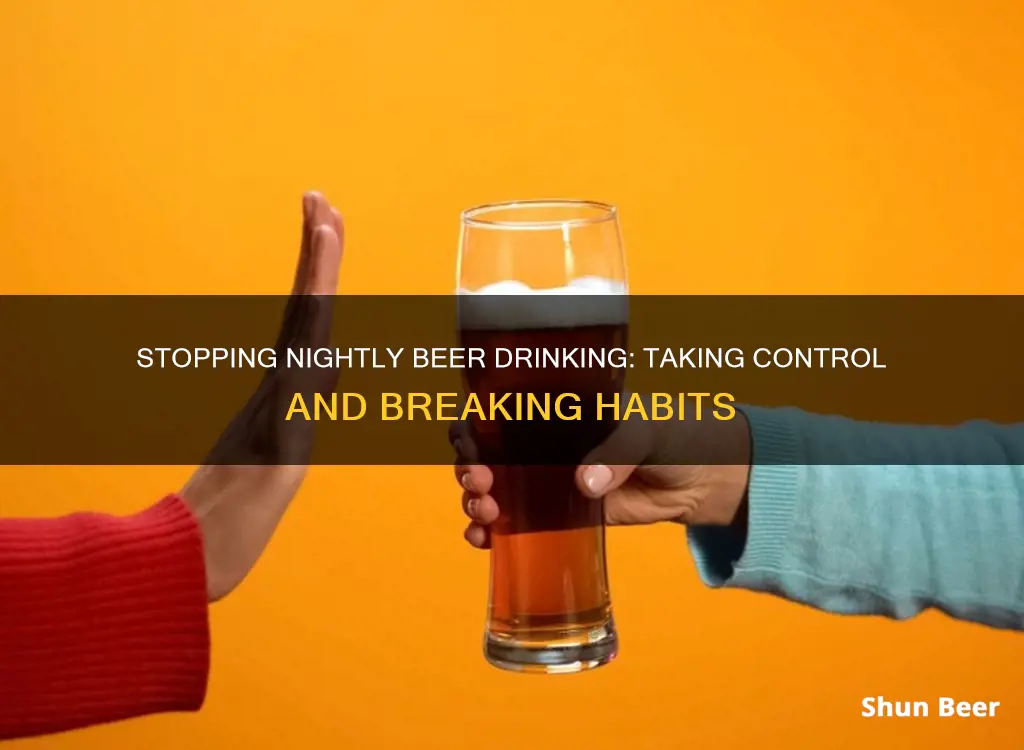
Drinking alcohol every night can have serious health consequences and increase your risk of developing alcohol use disorder (AUD). Even one or two drinks every night can be harmful, and the long-term effects of consistent alcohol consumption can be nefarious. To stop drinking beer every night, you can try creating physical distance between yourself and alcohol, preparing for each day by setting a calming morning ritual and identifying potential triggers, practising deep breathing, building a plan to fight cravings, and attending support groups.
| Characteristics | Values |
|---|---|
| Identify your reasons | Write down your reasons for wanting to stop drinking beer every night and keep them somewhere visible. This could include wanting to improve your relationships, health, or lose weight. |
| Set goals | Set realistic and achievable goals with specific time frames. You can start small and gradually increase your expectations. |
| Understand triggers | Recognise the people, situations, or environments that trigger your drinking. This could be certain friends, work stress, financial worries, or specific behaviours like always having a drink with dinner. |
| Plan ahead | Decide in advance when you won't drink alcohol and spread these days evenly throughout the week. Mark non-drinking days on a calendar or your smartphone. |
| Change routine | Plan a different activity when triggers arise, such as going for a run or having an alternative non-alcoholic treat. Change your route home to avoid pubs or bars. |
| Distract yourself | Find distractions to drinking, such as catching up with friends, listening to podcasts, making a snack or mocktail, or engaging in outdoor activities. |
| Drink alternatives | Opt for non-alcoholic drinks like water or juice, and try lower-strength alcohol if you do drink. |
| Drink slowly | Sip your drink slowly and avoid drinking on an empty stomach. |
| Alcohol-free days | Include alcohol-free days in your routine, starting with 2-3 days per week and gradually increasing. |
| Track progress | Keep a diary of your drinking habits, including what and how much you drink, to help you stick to your goals. |
| Seek support | Inform trusted family and friends about your plan to quit or reduce drinking. Join support groups like Alcoholics Anonymous (AA) or seek professional help if needed. |
What You'll Learn

Recognise the problem and set goals
Recognising that you have a problem with alcohol is the first step to cutting down or quitting drinking. While drinking a beer every night may not seem like a lot, those units quickly add up over a week. For example, one pint of beer every night adds up to around 16 units a week. The UK Chief Medical Officers' low-risk drinking guidelines recommend drinking no more than 14 units a week to keep health risks low.
Drinking alcohol every night can cause serious health issues. It can cause fibrosis or scarring of the liver tissue, as well as alcoholic hepatitis. If drinking continues for many years, the risk of developing chronic diseases such as liver disease, high blood pressure, heart disease, stroke, digestive problems, and several types of cancer increases. Drinking every night is also habit-forming, and over time, the body and mind develop a reliance on alcohol, both physically and psychologically.
If you are drinking every night and feel like you need increasing amounts of alcohol, or experience withdrawal symptoms when you don't drink, it may be time to seek professional help. However, there are also some things you can do yourself to try to reduce your dependence.
- Understand the risks of drinking: Educate yourself about the potential health risks and negative consequences of drinking beer every night. This can help motivate you to cut down or quit.
- Set achievable goals: Be SMART (Specific, Measurable, Achievable, Realistic, and Timely). For example, you could start by setting a goal to have two alcohol-free days a week and gradually increase the number over time.
- Write down your reasons: Write down the reasons why you want to cut down or quit drinking. This could include improved relationships, better health, weight loss, or saving money. Keep this list handy so you can refer to it often and boost your motivation.
- Understand your triggers: Identify the people, situations, or environments that trigger your drinking. It could be a particular group of friends, work stress, financial worries, or simply having a drink with dinner. Once you recognise your triggers, you can develop strategies to cope with them.
- Seek professional help: Consider reaching out to a trained professional, such as a therapist or counsellor, who can help you address the underlying causes of your drinking and provide you with tools to manage your cravings and develop healthier coping mechanisms.
- Join a support group: Consider joining a peer support group, such as Alcoholics Anonymous (AA), to connect with others who are also trying to cut down or quit drinking.
- Involve your support network: Tell your family and friends about your plan to quit or cut back on alcohol. They can provide encouragement and support and help hold you accountable.
Beer and Celiac Disease: Is There a Link?
You may want to see also

Understand your triggers
Understanding your triggers is a great way to reduce your drinking. Drinking alcohol often goes hand in hand with certain people, situations, or environments. It's important to recognize the reason for your drinking and what sets it off. It could be a particular social set of friends, work stress, or financial worries. Or it might be that you associate alcohol with other behaviors, like always having a drink with dinner.
Think about your triggers. It could be finishing work, putting the kids to bed, or simply a certain time of day. Once you identify them, you can work out how to get past those triggers and create new habits. For example, plan a different activity for when you finish work, like going for a run, or have an alternative "treat" ready to enjoy.
If you're doing a grocery shop, just buy enough alcohol for a specific occasion to help stick to your drink-free goals and save money while doing it. This will also stop you from having a surplus of alcohol at home. If you usually pop into the pub after work, change your normal route home. Or try out a different pub that offers some alcohol-free drinks. Once you've broken that routine, you'll probably find you won't need to even think about it or plan ahead.
Friends and family can be part of the problem, but they can also be part of the solution. It's important to reach out to people you know and explain that you're struggling with alcohol addiction. Knowing that someone else is looking out for you can make it easier to cope in stressful situations when you're likely to be tempted by alcohol. If you live with a partner, it's especially important that they're on board to help.
Carnivore Diet and Beer: Is It Allowed?
You may want to see also

Change your routine
Changing your routine is a great way to reduce your drinking. Here are some tips to help you stop drinking beer every night:
Firstly, identify your triggers. These could be certain times of the day, finishing work, putting the kids to bed, or particular people, social situations, or environments. Once you know your triggers, you can plan alternative activities to divert yourself. For example, if you usually go to the pub after work, change your route home or try a different pub that offers non-alcoholic drinks. You could even try an alcohol-free bar. If you tend to drink while making dinner, try having a non-alcoholic drink in your hand instead.
Plan some fun alcohol-free activities to fill your time. You could go for a run, walk, or play a sport. Take up a new hobby like painting, playing board games, or learning a musical instrument. You could also do some meditation or breathing exercises, or download a relaxation app to help you unwind. Set yourself a challenge, such as a step count or a reading challenge, to motivate yourself on non-drinking days.
Make sure you don't have a surplus of alcohol at home. When doing your grocery shopping, only buy alcohol for a specific occasion. This will help you stick to your drink-free goals and save money.
Finally, be kind to yourself. Changing habits takes time and effort, and you may experience setbacks. It's important to know that you might slip up, but you can always get back on track.
Gluten Insensitivity and Beer: Is It Safe to Drink?
You may want to see also

Find distractions and alternatives
Distractions and alternatives are key to stopping drinking beer every night. Here are some strategies to help you find distractions and alternatives:
Identify Triggers
Understanding your triggers is crucial to finding distractions and alternatives. Ask yourself, what are the reasons that make you want to drink? Is it being with friends, being alone, or feeling a certain emotion? Identifying these triggers will help you make a solid plan for dealing with those situations. For example, if you tend to drink when you're feeling stressed or anxious, try non-alcoholic alternatives like deep breathing, affirmations, or meditation instead.
Change Your Environment
Your environment can play a significant role in triggering the urge to drink. Removing alcohol from your house and avoiding alcohol-centric places like bars can be helpful. The brain creates strong associations between alcohol and these objects or places, so giving yourself space from them can help your brain think less about alcohol.
Find Distracting Activities
Keeping yourself busy with activities is an excellent way to distract yourself from the urge to drink. Take up a new hobby, revisit an old one, or engage in physical activities like walking, sports, or dancing. Activities that get you out of the house and moving are often the most helpful in breaking the drinking habit.
Discover Tasty Alternatives
Exploring non-alcoholic alternatives to your favourite beverages can be a fun part of the process. With the rising demand for alcohol-free drinks, you can find a variety of options like non-alcoholic beers, mocktails, and other beverages to enjoy. Finding enjoyable substitutes will make social situations more comfortable and help you stick to your goal.
Build a Support System
Quitting alcohol is a personal journey, but having a support system is crucial. Surround yourself with family and friends who can provide encouragement and understanding. Consider joining local support groups or communities where individuals share similar goals and experiences. Connecting with others who understand your journey can make a significant difference in helping you stay on track.
Remember, it's important to be persistent and patient with yourself. Breaking the habit of drinking beer every night takes time and effort, and setbacks are normal. By following these strategies and finding distractions and alternatives, you can successfully stop drinking beer every night and improve your overall well-being.
Drinking Non-Alcoholic Beer: Safe to Drive?
You may want to see also

Seek support
Seeking support is a crucial step in stopping drinking beer every night. This can involve reaching out to healthcare professionals, such as your doctor, counsellor, or therapist, who can offer advice, guidance, and treatment options. It is important to be honest with them about your drinking habits and goals so that they can provide tailored support.
Additionally, involving your family and friends in your journey can be beneficial. Informing them of your plan to quit or cut back on alcohol can foster a supportive environment and help them understand your needs. They can provide encouragement, hold you accountable, and help you navigate challenging situations.
Support groups, such as Alcoholics Anonymous (AA), also play a vital role in providing peer support. These groups offer a sense of community, shared experiences, and strategies for dealing with triggers and cravings. Attending regular support group meetings can help you stay motivated and connected with others who understand your struggles.
If you are experiencing unpleasant withdrawal symptoms or feel that you have developed a physical dependence on alcohol, it is crucial to seek professional help. Contacting your local treatment service or a specialised alcohol rehab clinic can ensure that you receive safe and medically supervised detox support. They can guide you through the detox process and provide additional resources to manage your cravings and maintain long-term sobriety.
Remember, seeking support demonstrates strength and a commitment to improving your well-being. By involving healthcare professionals, loved ones, and support groups, you can create a robust network of assistance to help you achieve your goal of stopping drinking beer every night.
Vintage Beer: Drinking Beer from 1996 and Beyond
You may want to see also
Frequently asked questions
If you're drinking every night, it's likely that you are. The UK Chief Medical Officers' guidelines recommend drinking no more than 14 units a week to keep health risks low. One medium glass of wine or a pint of beer every night adds up to around 16 units a week.
Drinking alcohol every day can cause fibrosis or scarring of the liver tissue as well as alcoholic hepatitis. If you continue drinking alcohol daily for many years, you increase your risk of developing chronic diseases including liver disease, high blood pressure, heart disease, stroke, digestive problems and several types of cancer.
First, set achievable goals. Don't go cold turkey, as this can be dangerous. Instead, set realistic expectations and time frames. Understand your triggers and try to avoid them. For example, if you always have a beer after work, change your route home.
Try to replace the behaviour with something healthier and more sustainable. Do some yoga, go for a walk, or watch something funny. Develop a calming morning ritual that includes a few minutes of mindfulness.







